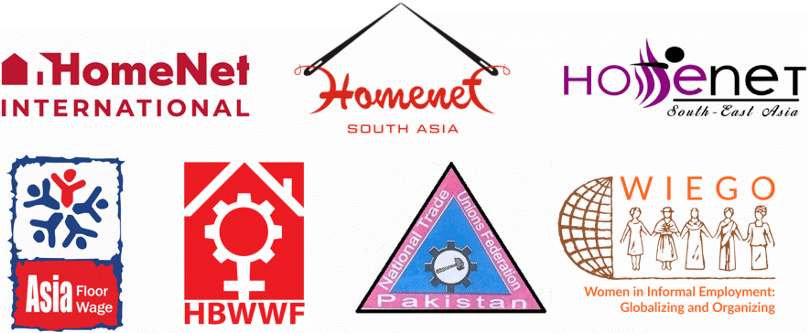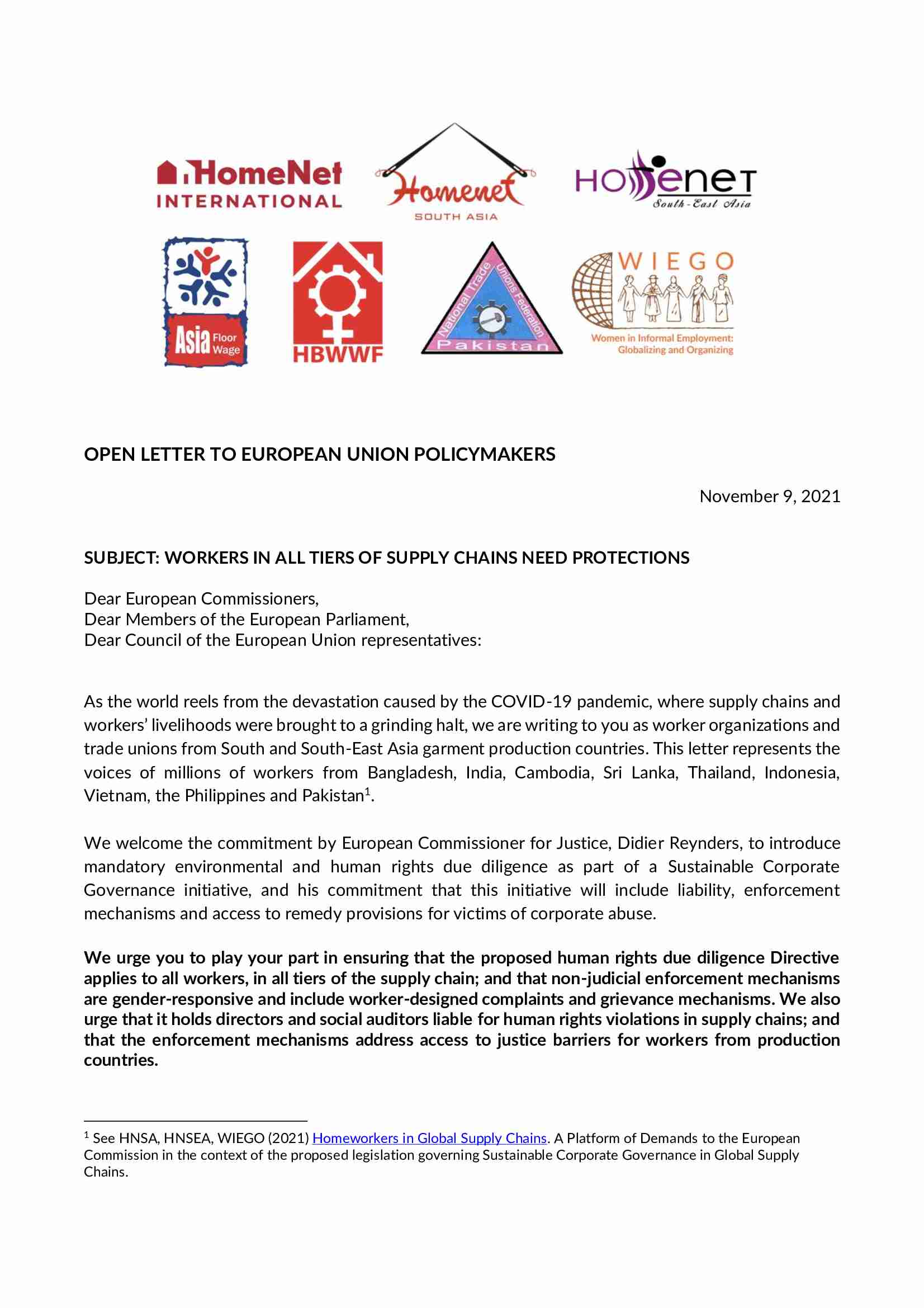Subject: Workers in all tiers of supply chains need protections
Dear European Commissioners,
Dear Members of the European Parliament,
Dear Council of the European Union representatives:
As the world reels from the devastation caused by the COVID-19 pandemic, where supply chains and workers’ livelihoods were brought to a grinding halt, we are writing to you as worker organizations and trade unions from South and South-East Asia garment production countries. This letter represents the voices of millions of workers from Bangladesh, India, Cambodia, Sri Lanka, Thailand, Indonesia, Vietnam, the Philippines and Pakistan[1].
We welcome the commitment by European Commissioner for Justice, Didier Reynders, to introduce mandatory environmental and human rights due diligence as part of a Sustainable Corporate Governance initiative, and his commitment that this initiative will include liability, enforcement mechanisms and access to remedy provisions for victims of corporate abuse.
We urge you to play your part in ensuring that the proposed human rights due diligence Directive applies to all workers, in all tiers of the supply chain; and that non-judicial enforcement mechanisms are gender-responsive and include worker-designed complaints and grievance mechanisms. We also urge that it holds directors and social auditors liable for human rights violations in supply chains; and that the enforcement mechanisms address access to justice barriers for workers from production countries.
The EU sustainable corporate governance regime must apply to all workers. If they only apply to permanent employees in tier one factories (primary suppliers), most supply chain workers, who work in smaller tier 2 and 3 factories, in workshops and at home, will continue to be vulnerable within these chains[2].
In India, for example, 89.9 per cent of workers in the garment sector work in small and medium enterprises. Many of these enterprises also subcontract to homeworkers. A recent survey of 340 garment factories in Delhi and Bengaluru showed that 58 percent of surveyed factories outsource to homeworkers, who work from their homes.
The further down the chain one goes, the less workers earn, and the more production costs and risks they carry. Before the pandemic, homeworkers, who are contracted directly by factory supervisors/‘contractors’ or by workshops to work from home, earned between half and one third of the minimum wage. They also carry production costs, including the cost of space, electricity and equipment such as sewing machines, needles and scissors.
Care must be taken not to incentivize suppliers to informalize the workforce, which may be an implication if only permanent workers in tier one factories are included. Since the lower tiers of supply chains are mostly unregulated, including by national legislation, suppliers can informalize the workforce with impunity. A study of 40 factories in eight garment and footwear producing countries found that it is common practice for suppliers to maintain one factory that complies with codes and to subcontract to other factories that are not audited and do not comply with the codes.
Data collected by the Asia Floor Wage Alliance (AFWA) in tier one factories in six countries suggests that most workers—particularly post-Covid—do not have secure employment. They are employed on either fixed term contracts or as casual workers performing daily wage and piece-rate work. Even if they are statutorily entitled to social protection and automatically become permanent employees after a designated number of years of continuous employment, factories terminate their employment just before the contract period expires to avoid statutory obligations. Many workers do not have written contracts or any proof of employment to demand employment and wage security. During the Covid-19 pandemic, suppliers have engaged in additional informalization strategies to shift production risks and costs to employees.
Ensuring due diligence covers all workers is a gender issue. In the garment sector, women are most often migrants, first generation labour-market participants and from lower castes and classes. Many factories employ women because gender norms have conditioned them to be compliant and these working arrangements are organized in a manner that silences women. Their employment is insecure because it is temporary, fixed-term contract work, casual work paid by the piece, and homework. This increases the likelihood of human rights violations as they are less likely to be unionized because they fear that it invites discrimination and dismissal and they are more likely to suffer sexual harassment.
Women workers, who make up 80% of workers in the garment sector, need genuine access to justice. They need to know who they produce for; what their rights are; and be able to access complaint and grievance mechanisms without the threat of economic or physical reprisal: without the threat that they will lose their jobs, or suffer gender-based violence if they complain.
Social auditing–the enforcement mechanism that enterprises and multi-stakeholder bodies have used to monitor their suppliers’ compliance with labour codes—has failed to protect workers from gross violations of their labour rights. The garment industry’s structure, financial incentives, methods, lack of competencies and lack of transparency inherently limit its ability to identify workers’ human rights violations. The failures of social auditing are outlined in this open letter addressed to the EU from civil society organizations. Currently such mechanisms do not comply with best practices for effective grievance mechanisms nor are workers able to access the mechanisms that do exist.
Social audit methods for collecting information are also gender-neutral and fail to capture women workers’ human rights violations. Women workers are unlikely to trust outsiders visiting a factory for three days and risk voicing the routine violations they face. Lack of freedom of association and the absence of mechanisms to ensure that they do not face retaliation for recording their complaints (including physical gender-based violence and harassment, higher production targets and loss of employment) prevent women workers from voicing their human rights violations.
Enterprises should support mechanisms that enable workers to bring human rights violations to their attention, whether it is to avoid liability or to fulfil their responsibility for identifying, preventing, mitigating, and addressing human rights violations in their supply chains. According to the Worker-Driven Social Responsibility Network:
[Social] audits are, at best, a snapshot of working conditions during a brief window of time, while an effective complaint resolution mechanism functions like a continuous video feed from the workplace, providing an open channel for workers to bring code violations to the attention of investigators without fear of retaliation.
These six principles can ensure access to justice for workers:
- It should be mandatory for enterprises to ensure that complaints and grievance mechanisms in supplier countries comply with the principles outlined in the OECD Guidelines for Multinational Enterprises.
- Workers and their organizations from every tier of the supply chain should participate in the design of complaints and grievance mechanisms.
- Women workers should be represented by organizations of their own choosing.
- As part of transparency, brands should contractually oblige their suppliers to ensure that every worker in every tier of the chain, irrespective of their status of employment, has a written contract that includes the name of the brand for which the worker produces.
- Brands should pay for the education of all workers in all tiers of the chain to know who they produce for; know their rights; and how the complaints and grievance mechanisms work. Workers and their organizations should participate in decisions about the design and delivery of training.
- Non-judicial enforcement mechanisms should be embedded within a comprehensive enforcement strategy that (1) provides for civil liability of directors and auditors and prevents audits and certifications from being safe harbours for corporations to avoid civil liability and (2) addresses barriers in access to justice, including short limitation periods for bringing judicial actions and a reversal of the burden of proof from plaintiffs to respondents.
Finally, enterprises should ensure “meaningful engagement” with all workers and their organizations in all tiers of the supply chain during each stage of the due diligence process – identifying, preventing, mitigating and remedying human rights violations. And inputs by workers’ organizations should be sought at every stage of the design and implementation of grievance mechanisms.
We trust that you will hear the voices of the most vulnerable workers in global supply chains from production countries and we look forward to a regime that offers protection from the ubiquitous human rights violations that women workers face.
Yours sincerely,
Asia Floor Wage Alliance (AFWA) is an Asia labour-led global labour and social alliance of
34 organizations across garment producing countries of South and Southeast Asia, including India, Indonesia, Sri Lanka, Cambodia, Pakistan and consumer regions including USA and Europe.
Home Based Women Workers Federation (HBWWF) represents 3000 home-based workers across Pakistan.
HomeNet International (HNI) is a global network of membership-based workers’ organizations representing 36 home-based worker organizations from 20 countries, representing more than 600,000 home-based workers.
HomeNet South Asia (HNSA) is a regional network representing 900,000 home-based workers from eight South Asian countries: Afghanistan, Bangladesh, Bhutan, India, Maldives, Nepal, Pakistan and Sri Lanka.
HomeNet Southeast Asia (HNSEA) is a regional network of national networks of home-based workers in Cambodia, Indonesia, Laos, Malaysia, the Philippines, Thailand, and Viet Nam. These seven country networks represent 76,000 home-based workers.
National Trade Union Federation Pakistan (NTUF) is a trade union federation that represents garment workers and other sectors of workers across Pakistan.
Women in Informal Employment: Globalizing and Organizing (WIEGO) is a global research-policy network dedicated to improving the working conditions of the working poor – especially women – in the informal economy. WIEGO’s members include 30 informal worker organizations in Africa, Asia and Latin America.

[1] See HNSA, HNSEA, WIEGO (2021) Homeworkers in Global Supply Chains. A Platform of Demands to the European Commission in the context of the proposed legislation governing Sustainable Corporate Governance in Global Supply Chains.
[2] von Broembsen, M (2021). ‘’Human Rights Due Diligence and Access to Justice: Worker-Centered Enforcement Mechanisms” FES Policy Brief (forthcoming).
